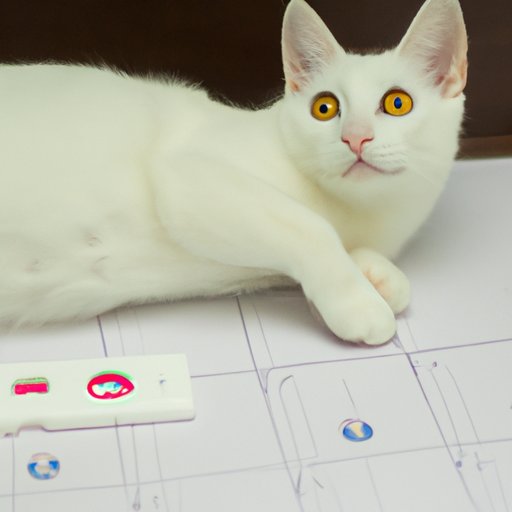Introduction
If you’re a cat owner, there may come a time when you find yourself wondering if your beloved pet is expecting kittens. While it can be difficult to determine pregnancy in cats without a veterinarian’s help, there are some signs that can indicate pregnancy in cats. In this article, we’ll explore what a pregnancy looks like in cats, as well as discuss the various methods to determine if your cat is having kittens.
Definition of Pregnancy in Cats
Pregnancy, or gestation, in cats typically lasts between 58-65 days, according to the American Society for the Prevention of Cruelty to Animals (ASPCA). During this time, the mother-to-be will experience physical and behavioral changes while her body prepares to house and nourish her offspring.
Overview of Symptoms
The most common signs of pregnancy in cats include increased appetite, weight gain, abdominal enlargement, nest-building behaviors, and changes in activity level and affection. However, not all cats will exhibit all of these symptoms, so it’s important to observe your cat carefully for any changes.

Observe Changes in Appetite and Behavior
One of the earliest signs of pregnancy in cats is an increased appetite. As the fetuses grow, they need more energy and nutrients, which can cause the mother-to-be to become hungrier than usual. If your cat is eating more than normal, it could be a sign she’s pregnant.
You may also notice a change in your cat’s activity level. Cats who are pregnant tend to be less active, preferring to spend their time sleeping and resting rather than playing or running around. Additionally, cats who are pregnant often become more affectionate towards their owners, wanting more cuddles and attention than usual.
Monitor Weight Gain
As your cat’s pregnancy progresses, you should take note of any significant increases in her weight. A pregnant cat will usually gain 1–4 lbs (0.45–1.8 kg) in the last few weeks of gestation. To monitor your cat’s weight, you can either use a scale or weigh yourself with the cat in your arms.
Check for Abdominal Enlargement
It’s important to feel your cat’s abdomen regularly throughout her pregnancy. As the fetuses grow, your cat’s belly will become larger and firmer. If you feel any hard lumps in your cat’s abdomen, these could be the fetuses or the fluid-filled sacs they are housed in. You can also look at your cat from above to see if her stomach appears larger than usual.
Look for Nesting Behaviors
Cats who are pregnant have an instinctive need to create a safe space for their offspring. This is known as “nesting behavior” and can involve rearranging furniture, gathering blankets and other soft materials, and spending more time in certain areas of the home. If you notice your cat exhibiting any of these behaviors, it could be a sign she’s expecting.

Take Your Cat to the Vet for an Ultrasound
The only way to definitively determine if your cat is pregnant is to take her to the vet for an ultrasound. This is a non-invasive procedure that uses sound waves to detect the presence of fetuses. An ultrasound can also be used to determine the number of kittens, their size, and the stage of development. The benefits of an ultrasound are that it is relatively risk-free and provides accurate results.
Conclusion
Determining if your cat is pregnant can be tricky, but with careful observation and the right tests, you can get an accurate answer. Be sure to keep an eye out for changes in appetite and behavior, monitor weight gain, check for abdominal enlargement, and look for nesting behaviors. If you’re still unsure, you should take your cat to the vet for an ultrasound. By following these steps, you can ensure your cat has a safe and healthy pregnancy.
(Note: Is this article not meeting your expectations? Do you have knowledge or insights to share? Unlock new opportunities and expand your reach by joining our authors team. Click Registration to join us and share your expertise with our readers.)
